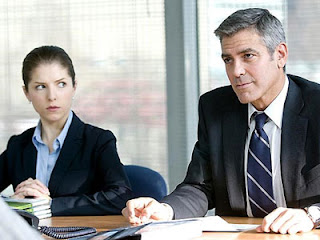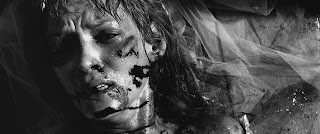It’s already March, but most of the movies I’m excited for in 2010 won’t be released until Summer. Only two movies have already been released that I was really looking forward. Those were
Shutter Island and
The Wolfman, both of which were released in February after lengthy delays, and neither of which disappointed. As for the rest of the year? Check it:
1. Tron: Legacy: The original
Tron was released in 1982, and if you saw this movie when you were a kid (or in 1982), you were probably blown away. That film follows computer hacker and arcade-gamer Kevin Flynn (Jeff Bridges) as he is transported inside of a computer and is made to compete in real-life computer games. The sequel, due out this December in IMAX 3D, looks like an updated version of the same, with Flynn’s son following in his father’s footsteps. Buzz is abounding on this sequel thirty years in the making, so let’s hope it doesn’t disappoint.
2. Inception: Christopher Nolan’s follow-up to
The Dark Knight stars Leonardo DiCaprio and Ellen Page in what looks like a psychological sci-fi noir. “Your Mind is the Scene of the Crime” is the tag line, and the trailers have piqued interest in many people who just want to know what the hell is going on. I’m no exception. Due out in July, also in IMAX.
3. Harry Potter and the Deathly Hallows: Part I: After a decade of
Harry Potter films we’re finally on the homestretch. The seventh book is being split into two parts, with
Part I being released in November of this year and
Part II set to debut the following summer. Us
Harry Potter fans are already arguing over how the changes made in the sixth movie will affect the seventh and where
Deathly Hallows will be split up. It’s directed by David Yates, who helmed both
The Order of the Phoenix and
The Half-Blood Prince previously. The studio has also decided to convert the film to 3D, an unnecessary move.
4. Iron Man 2: Iron Man was the surprise success of the summer of 2008, making a sequel inevitable. The first film ended so brilliantly that many fans wanted another go around, making
Iron Man the most successful comic book film based on a lesser-known superhero. Most of the major players from the first film are back for
Iron Man 2, including Robert Downey, Jr. , Gwyneth Paltrow, and director Jon Favreau. Terrence Howard is replaced by Don Cheadle as Rhodey, which is an upgrade. Look for it in IMAX in May.
5. The Green Hornet: This film could turn out to be brilliant or a complete mistake, but everybody’s hoping the former. Michel Gondry (
Eternal Sunshine of the Spotless Mind) is directing this comic book film, starring Seth Rogen as the titular superhero. The film should be a new take on the traditional superhero film, with the imagination of Gondry and the comedy of Rogen. Kevin Smith was originally going to make his own version of
The Green Hornet a few years back before dropping out due to lack of confidence. I’d much rather see this version anyway. It’s to be released in late December, directly competing with
Tron: Legacy.
6. The Social Network: David Fincher is directing this adaptation of Ben Mezrich’s novel about Mark Zuckerberg and the founding of Facebook. The film stars Jesse Eisenberg (
Adventureland,
Zombieland) as Zuckerberg as well as Justin Timberlake and Rashida Jones. I was a little leery of this project at first, but I have confidence in Fincher to deliver a solid movie that’s a little outside of his comfort zone. Due out in October.
7. Wall Street: Money Never Sleeps: The original
Wall Street was released back in 1987 and was topical for the time period. With the rampant greed on Wall Street and the current economic crisis, Oliver Stone decided to go back to the well to bring us
Wall Street: Money Never Sleeps. The sequel takes place just as Gordon Gekko (Michael Douglas) is being released from prison (spoiler alert!), and follows Jacob Moore (Shia LaBeouf), whose engaged to his daughter, as he tries to enter Gekko’s world. Also starring Carey Mulligan, Josh Brolin, and Frank Langella, the film has just been pushed from its April release date back to September.
8. True Grit: A remake of the 1969 John Wayne picture,
True Grit stars Matt Damon, Josh Brolin, and Jeff Bridges. The film is a long way off and it’s only just started shooting, but with the Coen Brothers at the helm, there are high expectations. Set to be released on Christmas Day.
9. Predators: Robert Rodriguez is producing this revamp of the 1987 film starring Arnold Schwarzenegger. Topher Grace and Adrien Brody star in the new version, with Nimród Antal directing. Antal has yet to prove himself (
Vacancy was terrible), but with Rodriguez overseeing the project, it will hopefully exceed expectations. It’s set to be released in July.
10. Toy Story 3: I saw the first
Toy Story in theaters when it was released in 1995, and even as a kid I knew it was different. Animated films haven’t been the same since. It’s been fifteen years since the original, and after a hugely successful sequel, Pixar decided to go for the threepeat. Due out in June,
Toy Story 3 should be another great film from Pixar.
I'm not expecting this list to replicate (or necessarily resemble) what will ultimately be my Top Ten Films of 2010, but these are the films I'm most excited to see this year. Not until much later in the year does the general public become aware of many of the really good films that will sneak into release before the end of December. All of the films listed on my list are major releases for this reason. But I'm just as excited for the films I haven't even heard of yet.


















































